Part of 5C Highway Connecting Osijek to Beli Manastir Opened
December 2, 2022 - Yesterday, the section of Corridor 5C highway, connecting Osijek and Beli Manastir, 25 kilometers long, was opened.
The town of Osijek celebrated their day yesterday, and as a part of that celebration, Prime Minister Andrej Plenković opened yet another section of the popular Slavonika highway, Večernji list reports. Corridor 5C is an international traffic route whose goal is to connect Budapest and Ploče, and its Croatian section will be 88.6 kilometres long, and all but the final five kilometres have now been completed. The last five kilometres between Beli Manastir and Ivandarda will be completed in 2024.
This was a joint venture, thanks to HBOR and EBRD, whose funds and extremely favorable interest rates made this project a reality, Plenković added. This means that the balanced regional development of Croatia, transport connectivity and the construction of transport infrastructure are strategic priorities of our Government. The investment in this section of the highway was HRK 206.4 million.
The construction of Slavonika, which is what the Croatian section of the corridor 5C highway is often called, started in 2005, and two years later the first section from the Sredanci rest stop to Đakovo, 23 kilometers long, was put into traffic. The mayor of Osijek, Ivan Radić, stated that the opening of the Baranja section is the best gift to Osijek. He pointed out that Osijek is now two hours away from Zagreb, and now they will be two hours away from the capitals of the neighboring countries, Budapest and Sarajevo.
The Osijek Baranja Prefect Ivan Anušić pointed out that the bridge over the Drava River, as part of Corridor 5C, is the longest bridge in Croatia, and bears the name of the 3rd Guards Brigade, which made the greatest sacrifice in the Homeland War. The mayor of Beli Manastir, Tomislav Rob, said that this is a historic day for Beli Manastir and the whole of Baranja, the biggest one since the peaceful reintegration.
Ukrainian Embassy in Zagreb Receives Gory Package
December 2, 2022 - Croatian media report and the Ukrainian embassy in Zagreb has confirmed on their social media that they are among the embassies which have received extremely gory packages today.
The first report of the threat came from Oleg Nikolenko, the spokesperson for the Ukrainian Ministry of Foreign affairs. In it, he mentions that one of the packages was sent to the Ukrainian embassy in Zagreb.
The packages supposedly contained animal eyes and were soaked in a liquid of "characteristic colour" (not too difficult to determine which colour it is from the context clues, although not explicitly stated).
In addition to the embassy in Zagreb, similar packages were sent to embassies in Hungary, Netherlands, Poland, Italy, and Austria, as well as to consulates in Naples and Krakow. Additional threats to the embassy in Vatican, Kazakhstan and the USA are also being reported and are investigated.
When asked to comment, Croatian Prime Minister Andrej Plenković briefly stated that the Croatian police is in charge of keeping embassies safe.
We will update this story when further information about the events in the Zagreb Ukrainian embassy becomes available.
A Week in Croatian Politics - Ukrainian Soldiers, Schengen, Euros and Hats
December the 2nd, 2022 - This week in the often weird world of Croatian politics, we've been dominated by football, Qatar and people's outfit choices more than we have much else. Still, Ukraine, Schengen, Croatia's now rapidly approaching Eurozone accession and more are still reigning strong. Oh, and let's not forget the drone from back in March which we're still not sure who launched.
Who was best dressed for the most recent Croatia match in Qatar - former president Kolinda Grabar-Kitarovic, or the wife of current president Zoran Milanovic, Sanja Music Milanovic? That is the question!
Croatia has been progressing well in Qatar, and with some of Croatian politics' main women being present, including former president Grabar-Kitarovic, who is known for her unbridled passion and love for the Croatian national team when they play. Memes were made, articles were written, comparisons were made - but who wore it best? Index even had a poll, check it out for yourself here.
Parliamentarian Kreso Beljak is against training Ukrainian soldiers here in Croatia, believing we have nothing to teach them
Member of Parliament and president of HSS (Croatian Peasants' Party), Kreso Beljak made a guest appearance on N1 television/televizija recently, during which he explained why he is choosing not to support the government's proposal on the training of Ukrainian soldiers here in Croatia. He also commented on the parliamentary debate on the matter and the decision of Parliament Speaker Gordan Jandrokovic, who banned him from speaking for two days.
Beljak claims that Jandrokovic cut him off when he suggested to Defense Minister Banozic that it might be time to take a different view of things and try to sit down with President Zoran Milanovic on the matter. He accused the Speaker of the Parliament of not allowing him to exceed his speaking time by 12 seconds, and after that he only allowed HDZ representatives to reply to him, while he himself failed to have the opportunity to speak.
"I'm a public figure, I represent the people who pay me to do so, and that Jandrokovic with all his complexes isn't going to stop me from doing that," he said. Beljak also explained why he will not support the government's proposal on the training of Ukrainian soldiers, although he emphasises that it is indisputable that Russia is the aggressor and Ukraine is the victim in this situation
"A war is being waged, it's being waged with technology that we could only dream about or see in sci-fi films, aircraft, drones... something that we could've only imagined back in 1991. I don't see what we, that is, the Croatian army, could ever teach the Ukrainians at this moment in time, it could only be the other way around," said Beljak.
He is convinced that the entire story surrounding the training of Ukrainian soldiers is actually a spin of Prime Minister Andrej Plenkovic, who wants to ingratiate himself with high-ranking people within NATO and the EU and use this situation to do precisely that. He concluded that he'd support the decision on military training if all EU member states participated in it, but that he will not because only ten of them, Croatia included, have agreed to take part.
Nobody has any issues with Croatian joining Schengen, the EU's top brass claims
The Committee of Permanent Representatives (Coreper), which consists of ambassadors of European Union member states, discussed the expansion of the Schengen area to Croatia, Bulgaria, and Romania as part of the preparations for the meeting of the Council for Justice and Internal Affairs next week.
No member state had objections to the proposal to admit Croatia to Schengen. According to their internal rules, some member statesmust obtain the approval of the competent committees in their national parliaments for their positions in the EU Council.
The governments of Sweden, Denmark, Slovenia, and the Netherlands have submitted proposals to their parliaments supporting Croatia's entry and are now waiting for their green light. All other EU and Schengen members have already confirmed their support for Croatia. Coreper will again have the expansion of the Schengen area on the agenda on December the 7th, just one day before the meeting of interior ministers who should take the final decision.
You can read more into this very important matter for the world of Croatian politics by clicking here.
President Zoran Milanovic talks energy crisis, claims that Russia and the United States of America are two large and indestructible countries, but China isn't
Zoran Milanovic said on Tuesday that energy isn't a commodity, but a resource that guarantees security, independence and strength, and that the European Union is currently in a situation where it will ''have to buy gas from the USA at three times the price".
"Energy is a key issue at this moment, but it always is otherwise,'' said Milanovic at the opening of the "Business Meets Politics - Energy Today and Tomorrow'' economic forum, organised by the Slovenian-Croatian Business Club and the Slovenian Embassy in Croatia, held as part of the visit Slovenian President Borut Pahor to Croatia. Milanovic stated that Croatian Schengen accession will see the two neighbouring countries cooperate and deepen their ties even more.
Milanovic then said that Russia and the USA, each in their own way, aren't "two large and indestructible states" just by chance. "They're indestructible because they have certain technologies (...) and unlimited amounts of energy for their needs. China is no longer that category," Milanovic asserted.
For a long time, the European Union was "under the illusion" that it would establish an energy market, but given the serious state of the Russia-Ukraine war, it came to the point that it would simply need buy gas from its ally, the USA, at three times the price, he claimed.
"Those countries are in a very serious state of war, more serious than ever before in our lives. We've come to the conclusion that we'll just have to buy gas from our allies at three times the price. That's a fact. It's going to cost us money," he said.
He also said that this is why French President Macron went to the US to talk with US President Biden. "Actually, he went to beg from the position of a weaker partner for understanding and mercy," Milanovic assessed in his usual ''gloves off'' style.
Croatia will be much more deeply protected when we introduce the euro as our official currency, claims PM Andrej Plenkovic
Prime Minister Andrej Plenkovic recently said at the Days of Regional Development and EU Funds conference which was held in Opatija that the county needs to face the great challenge of declining natural growth and the demographic deficit far more seriously, as this is all becoming an essential strategic problem in and for Croatia.
"Now it's up to us to make our country and society as high-quality as we possibly can, to face the great challenge of the decline in natural growth, the demographic deficit that is becoming an essential strategic problem of the Croatian people and society, and where we must use all good practices and mechanisms to at least slow down the negative the trends we're dealing with," emphasised the Prime Minister.
In his presentation, Plenkovic also said that the meeting on regional development and EU funds is significant because it takes place in a year that was full of numerous EU activities and the completion of large projects and processes which were of enormous importance for the country in a strategic sense, as well as for Croatian politics.
"This is the year in which we completed the largest EU project of the Peljesac bridge and all of its access roads, which will forever be a symbol of the first seven years of EU membership and which finally connected the territory of the Republic of Croatia," said Plenkovic, adding that "we showed what modern sovereignty looks like and how the strengthened position of Croatia can best be used for the realisation of our strategic national goals."
He noted that we're now in the very last month in which our currency is the kuna, and that in a month, Croatia will become the 20th member of the Eurozone, scrapping the kuna and adopting the bloc's single currency.
"Croatia will be much less exposed and much more protected when it joins the Eurozone,'' he said, noting that a ministerial decision on Croatia's entry into the Schengen area is expected very soon. He assessed that it is a precedent that the country enters both the Eurozone and the Schengen area on the very same day in January 2023.
"This means that through the two mandates of our government, we've achieved our strategic goals and reached the stage where, after only 30 years of international recognition, we're among fifteen countries in the world that are in NATO, the EU, Schengen and the Eurozone.''
Going back to the Ukrainian, or Russian (or whoever's) drone which landed in Zagreb earlier this year, the Defence Minister has stated that no, he still doesn't know where it came from or who launched it
The Croatian Ministry of Defense reacted to how the media reported the statement of Minister Banozic about the drone that fell in Zagreb back in March this year. Their reaction is presented below. "Regarding media articles under the headings "Minister Banozic: We know who launched the drone that fell on Zagreb" and similar, in order to provide true and objective reporting to the public, the Ministry of Defense is obliged to react.
Namely, the texts published an incorrect quote as well as an incorrect interpretation of what Banozic said in the Croatian Parliament on November the 30th, 2022. Minister Banozic never said "we know who launched the drone that fell on Zagreb, but it's a secret".
He referred to the fact that the unmanned aircraft passed through several countries and stated that Croatia exchanged information with NATO member states, but didn't prejudge the final information about who launched the drone, about which the investigation is still ongoing," explains the statement issued by the Croatian Ministry of Defense.
The Ministry of Defense then wrote exactly what Banozic actually said in the parliament in response to the reply of the representative of the Homeland Movement, Stipe Mlinaric:
"Responding to the reply of Stipe Mlinaric, a member of the Croatian Parliament, the minister said: "First of all, I want to say that neither Prime Minister Plenkovic nor I took pictures of ourselves standing next to any hole/crater [left by the drone when it crash-landed], we were present at the location for which we expressed concern based on analyses at the time, which clearly showed that there was a threat being made from the incoming missile itself.''
For more on Croatian politics, make sure to keep up with our dedicated section, and follow our Week in Croatian Politics articles which are published each Friday.
Croatia into World Cup Last 16: Zlatko Dalić Comments on Japan, Joško Gvardiol, and VAR
December 2, 2022 - Croatia coach Zlatko Dalić addressed the press the morning after Croatia secured their World Cup round of 16 spot. Croatia will play Japan on Monday, and Dalić gave his first impressions.
The Croatia national team will play in the 2022 World Cup round of 16 against Japan, the winner of Group E. Second-placed Croatia will thus face a rather unexpected opponent for a spot in the quarter-final. Coach Zlatko Dalić spoke to the press in Qatar the morning after Groups E and F were completed.
Recall Croatia and Morocco drew 0-0 in the opening match, after which Croatia beat Canada 4-1 and finished 0-0 against Belgium, enough to win second place in Group F. Croatia thus crosses over with the winner of Group E, Japan, which lost to Costa Rica 0-1, and beat Germany and Spain 2-1.
Have you had time to analyze the match against Belgium one more time?
"I looked at it last night in peace, I got the statistics, and the impression is better than yesterday. Great match by Croatia, great 98 minutes. Control, defense, pressing - everything was at the highest level. Full control. We had two or three situations that could have been fatal, but they came from our mistakes, not Belgium's game.
The complete story was great. There were so many good things. According to statistics, we ran 122 kilometers and did not fail in that segment. Everything we did was very, very good. The impression after the recording is better than after the game."
What awaits Croatia against Japan?
"Tough game for both teams. Spain took the lead and thought it was over, but Japan never wavers and never gives up. Japan deserved to win because they were compact and fast. Germany was eliminated, and Belgium and Denmark, which speaks of the quality of the other national teams. Maybe earlier, we would have chosen Japan as the best option, but they beat Germany and Spain, and Japan is anything but an easy opponent."
How is Croatia doing physically?
"We work very well all the time; training is at a high level. We didn't fail the physical fitness part, and I'm not afraid of that. We have to rest for two days and prepare for Japan, but we are full of energy and motivation. We want to avoid injury. We can't rest the whole team, but it's not necessary either."
How would you rate Japan as a team, and what will be critical for that game?
"If someone finishes first in the group ahead of Spain and Germany, they are good and quality. Japan showed that they do not give up. They came back after losing and have great quality. We must be disciplined and patient and not make mistakes at the beginning of the game. Japan punishes it with counterattacks. We have to have a good comeback."
How does it feel to be statistically one of the best coaches at the World Cup?
"I will look at it from the aspect of Croatian football and the national team. We have continuity; we are always at the top. Along with Germany and France, we are the only ones with medals in the last 20 years. We are a small country; we must be happy and proud. It's not my success, but it's the success of all of us. I hope this is not the end and that Croatia will do better and bigger things.
We have become a team that deserves the respect I'm talking about, not that we play at 1 pm as World Cup finalists. We deserved it with the results. However this ends, it is a fact."
What is the next goal?
"Appetites have not increased. We must be calm and modest and look for what is most important. It's the next game. We must not think that we have done great things. We did what we were preparing for, and we are moving on. When we were first in the group with nine points in Russia in 2018, we went to Denmark. I said then that we would have been losers if we had lost that game. No one would remember the group.
It is the same now. We will not go with big announcements. We will try to win the next game and take the next step. We must be firmly on the ground. We know that Japan has a lot of players in Europe, or eight of them in the Bundesliga. They also have players at Celtic, good players in the championship. The Japan coach knows European football. Japan will be a worthy rival to Croatia.
I'm not surprised that Japan is in the round of 16. They deserved it with their games and quality, and I congratulate them on that."
Dalić commented on the photo of Joško Gvardiol in his mother's arms.
"It warmed my heart when I saw it. That's why he's the best stopper in the world; you can't be complete if you don't have those feelings. That picture is the picture of the Croatia national team. I congratulate his mother for raising such a son."
And what about that VAR call in last night's match?
"I don't usually comment on the reffing, but I was angry. It's a centimeter; it takes away the emotion. Because of this, Croatia lost the World Cup title. It hurts. If this were the interpretation, that hand in Russia would not be a penalty."
Source: Index.hr
To follow the latest sports news in Croatia, follow TCN’s dedicated page.
Where Luxury Collides: Wanda Radetti Meets Hotel Ambasador in Split
December 2, 2022 - When two luxury tourism pioneers collide, as Tasteful Croatian Journeys founder Wanda Radetti meets Hotel Ambasador, the first luxury waterfront 5-star hotel in central Split. It was quite an evening.
It only takes a few good people, those with vision and a pioneering spirit, whose efforts, dedication and passion can truly bring change.
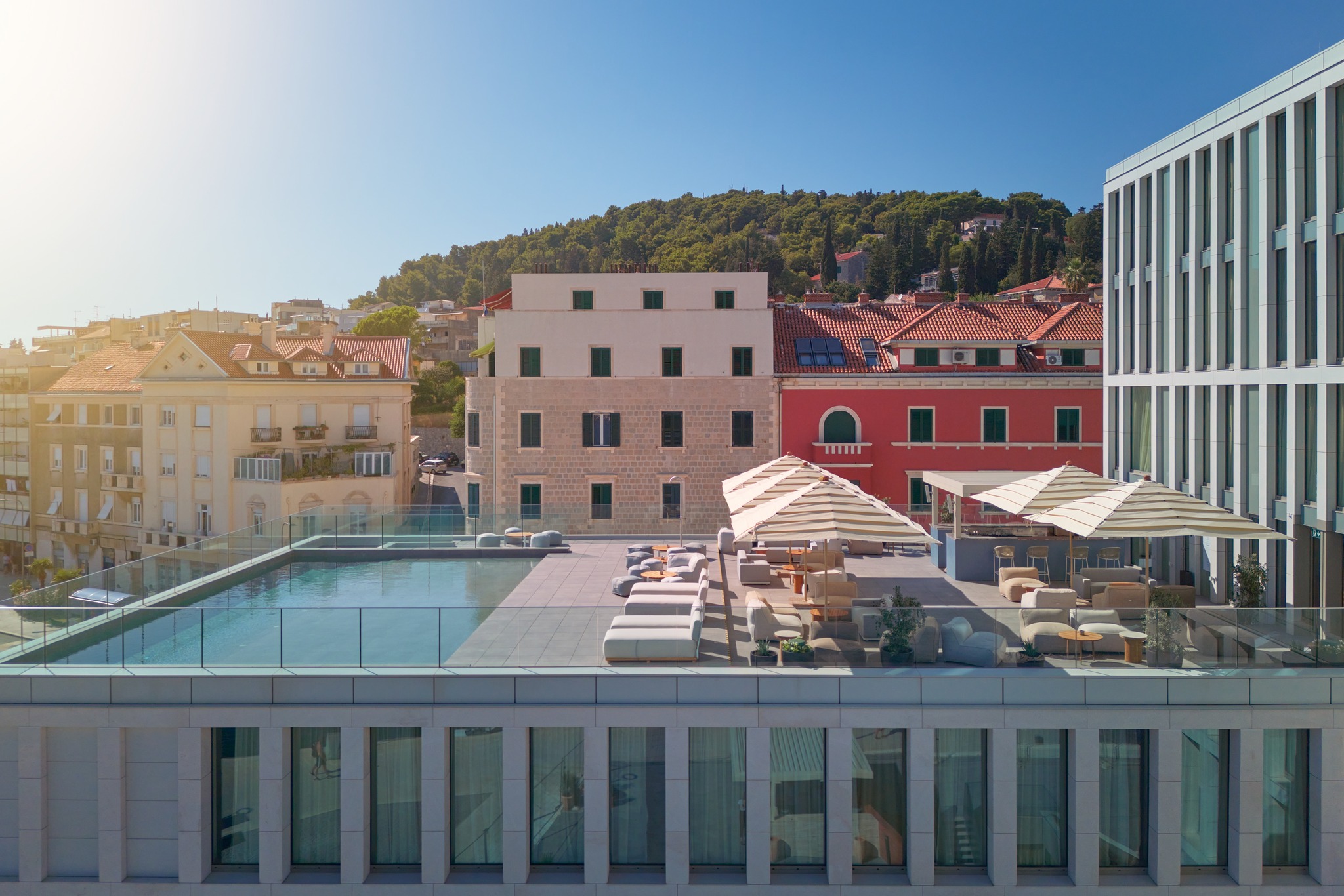
I was reflecting this as a sipped on an excellent glass of Babic after the main course of deer rumpsteak, Roman gnochhi roll with cranberry cooked in Port wine, Jerusalem artichoke cream, butter glazed Brussel sprouts, and demiglace.
Opposite me was a lady I had wanted to meet for a very long time, the truly pioneering founder of luxury Croatian tourism from the USA, and Conde Nast's preferred Croatian partner every year since 2006, Wanda Radetti, whose Visit Croatia Tasteful Croatian Journeys project has arguably done more than anything to raise the profile of Croatian tourism in this crucial market.
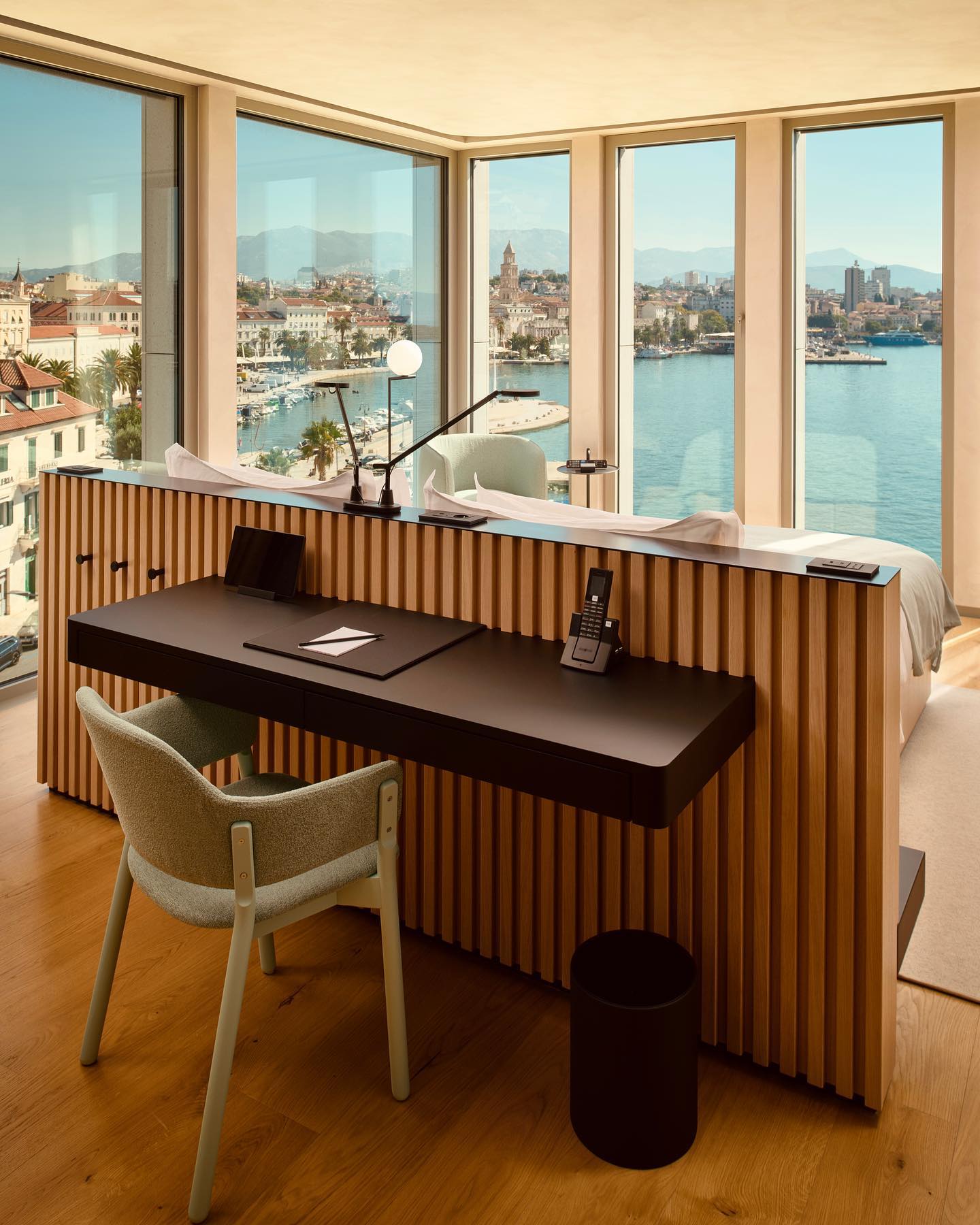
The location? The restaurant in the newly-opened 5-star Hotel Ambasador on Split's West Coast, a hotel which has (at least in my opinion) already changed the perception of Split as a luxury tourism destination since opening a few months ago. Wanda was here on her first inspection trip with a view to adding Ambasador to her already impressive portfolio of hotels for her excellent tours from Istria to Dubrovnik.
It is a far cry from the humble beginnings of Wanda's luxury tourism journey in Croatia, which started with her first-ever tour 27 years ago back in 1995. Yes, you heard that right - the same year that the Homeland War ended, Wanda was already bringing tourists from North America on high-quality (at least given the resources available in a nation suffering from a four-year war), as she brought over a group of diaspora women from the Histra Association of Women. It was a trip which was unecognisable from the 5-star luxury tours today which have justified the trust of Conde Nast for the last 16 years.
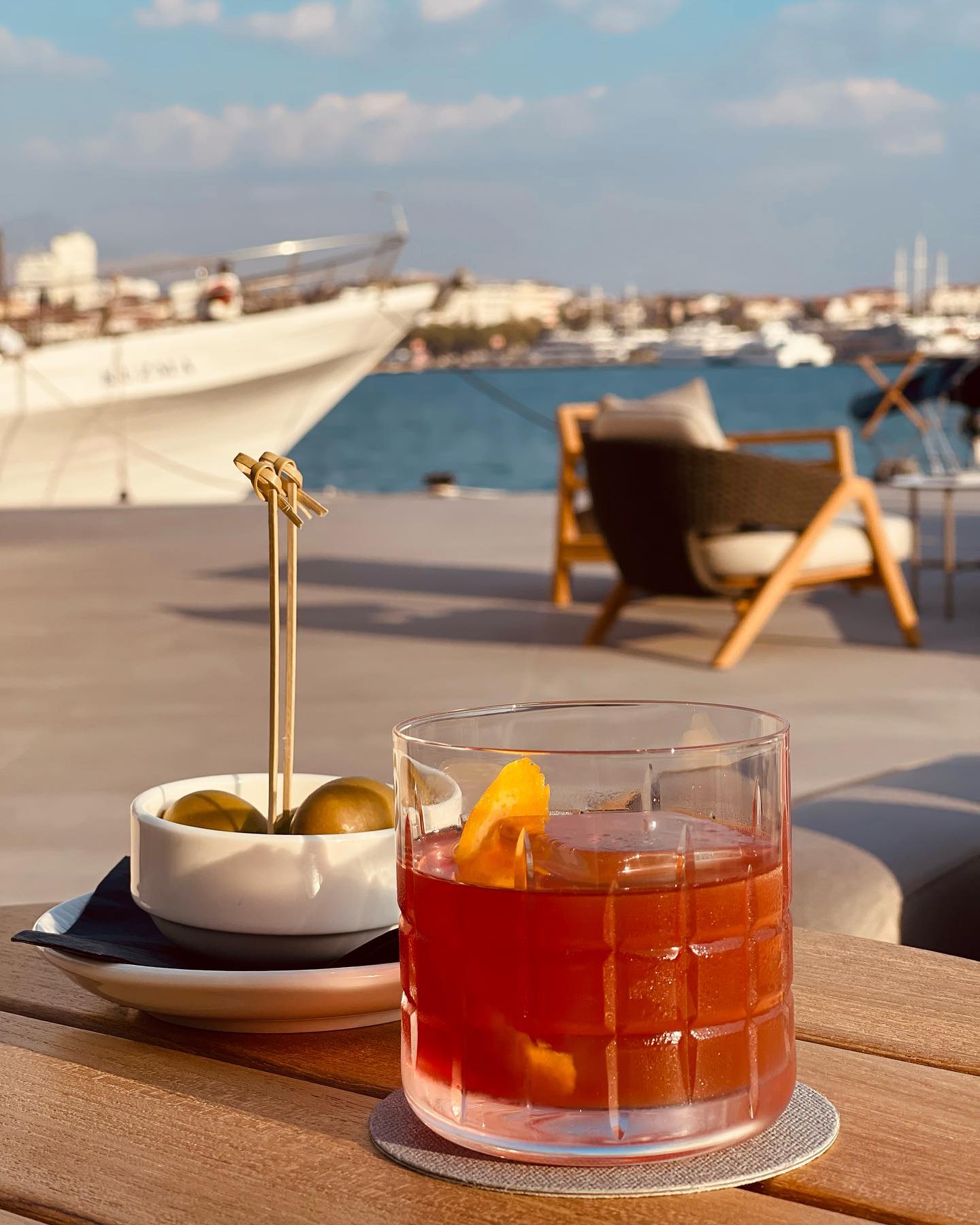
Just finding a hotel open was a challenge, never mind things to see and tourism providers to offer tours. The only hotel available was in Opatija, and so daily day trips to Istria were the norm. As for the wine from the famed wine-producing region of Istira, which today gets awards on the international stage, back then it was pretty undrinkable. Tending to vineyards in a time of war is low priority.
What was immediately evident from our first exchange is what an excellent communicator Wanda is, always with a word for everyone. Over the years, those waiters and bellboys of 1995 became general managers of top hotels and some of the most important players in Croatian tourism. Wanda knows them all and has watched - and encouraged - their careers grow. As such, she has built up an unparalleled network of places, experiences and - most of all - goodwill, which she can pass on to her clients in the form of outstanding tours with the very best service and attention to detail.
When Wanda suggested we have dinner at Hotel Ambasador, I smiled and agreed immediately. Apart from being absolutely my favourite place to stay on the coast - you will not find a better view from Dubrovnik to Rovinj - I was curious to see how a luxury travel expert such as Wanda would take to the new hotel star on the Split waterfront.
As I had already stayed at Ambasador a couple of times, I gave Wanda one piece of advice, which I am pleased she took - to sleep with the curtains open, so that she could fully appreciate the magnificent view of Split, as its colours changed through the day and night. I truly have not seen a better hotel view in this country.
It is one of the few places in the world that I don't mind if I wake up in the night, or very early - spectacular.
Split by night, as seen from the Ambasador.
Just magnificent.
Wanda was clearly impressed too, commenting on the quality of the materials and finish. She was a joy to watch in action, with a kind word for all, a probing question to learn more for her clients, and a watchful eye on everything that was going on in the hotel. If she was going to promote a hotel to her clients, she was going to do it from the viewpoint of total knowledge. This was a site inspection performed by an experienced eye who knew exactly what levels of quality her clients would expect. And she wasn't shy of pointing out a few small areas of improvement, suggestions that were gratefully received and immediately implemented.
The Hotel Ambasador lobby is very striking as you enter, mainly due to the outstanding photogaphy which adorns the walls with huge pictures of life in Split in the 1950s and 1960s. A wonderful connection of hotel and city, and one whose photos take guests back to a different era. Wanda captured them too
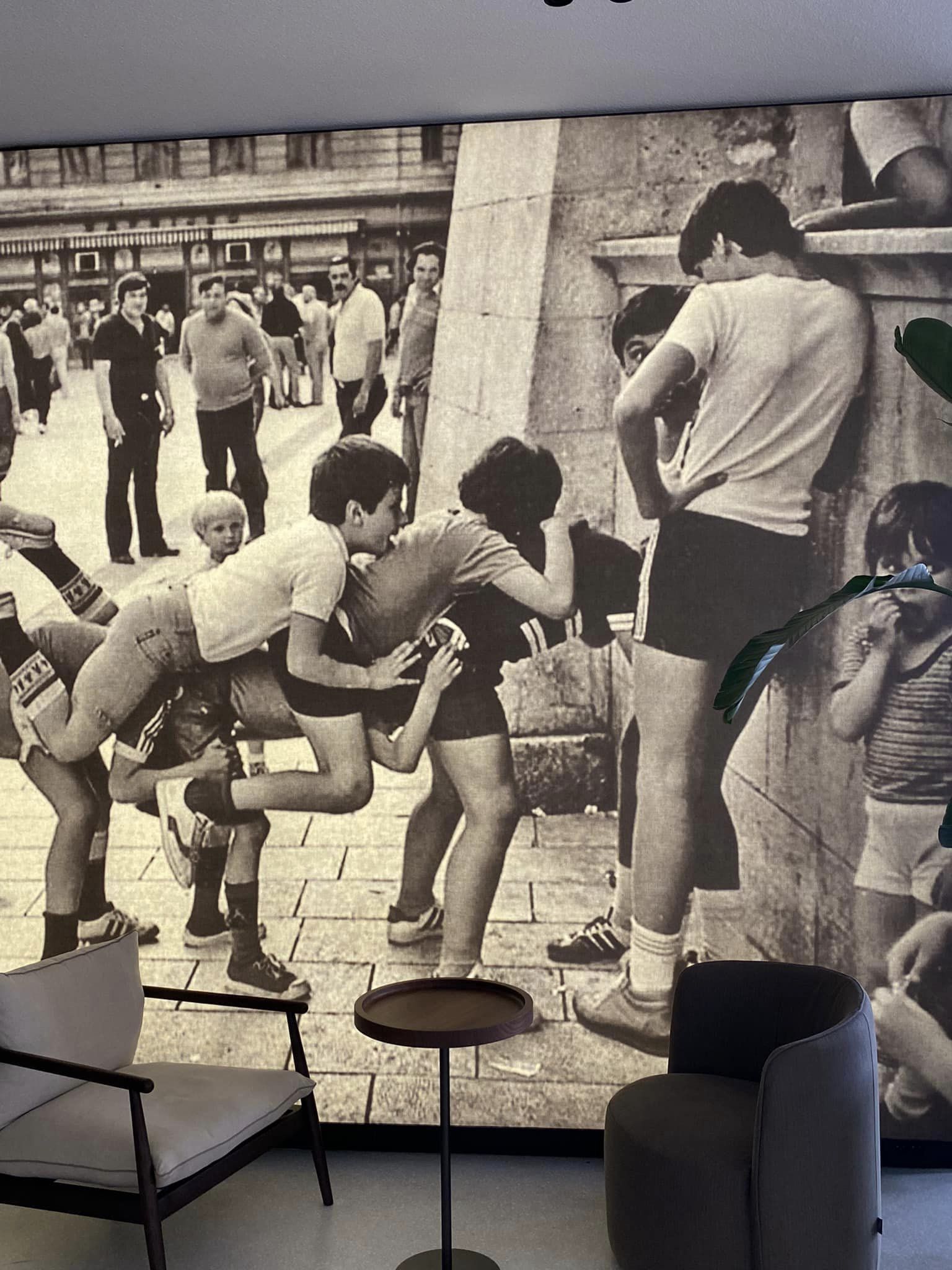
This is my favourite photo in the lobby, as well as my favourite story from the Ambasador so far. In an age before gadgets, where kids played on the streets for hours, this game was very popular. Soon after the hotel opened, some older locals came in to have a look around, and one pensioner was shocked when he saw the photo, for there he was in the photo, some 60 years ago. I suggested that perhaps they could have a media campaign to see if they could identify the rest of the kids and then organise a reunion dinner.
Wanda's mission was to also meet the staff, so that she could advise her clients, and there are few more important than the head chef, and Ivica Katic spent some time with Wanda exploring the menu options for future guests.
And so to the food at dinner. Although I am not an expert, I find that dining in 5-star hotel restaurants can be a little hit and miss, and it is not unknown for me to dine in such institutions and come away hungry. Not so at Ambasador, and what a delightful and creative meal it was too.
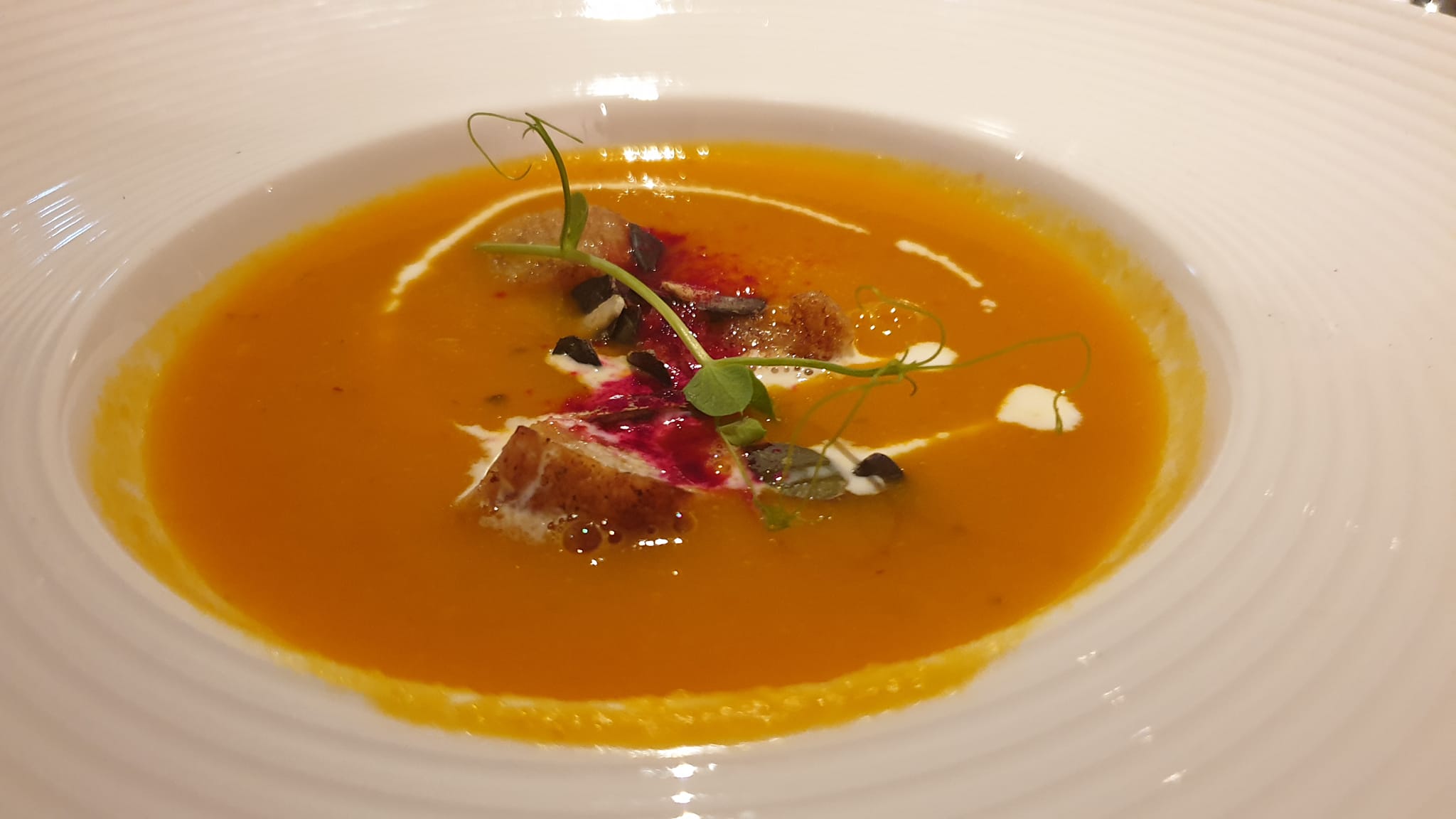
AUTUMN SOUP
-Butternut squash, butter glazed croutons, beetroot powder, pumpkin oil cream
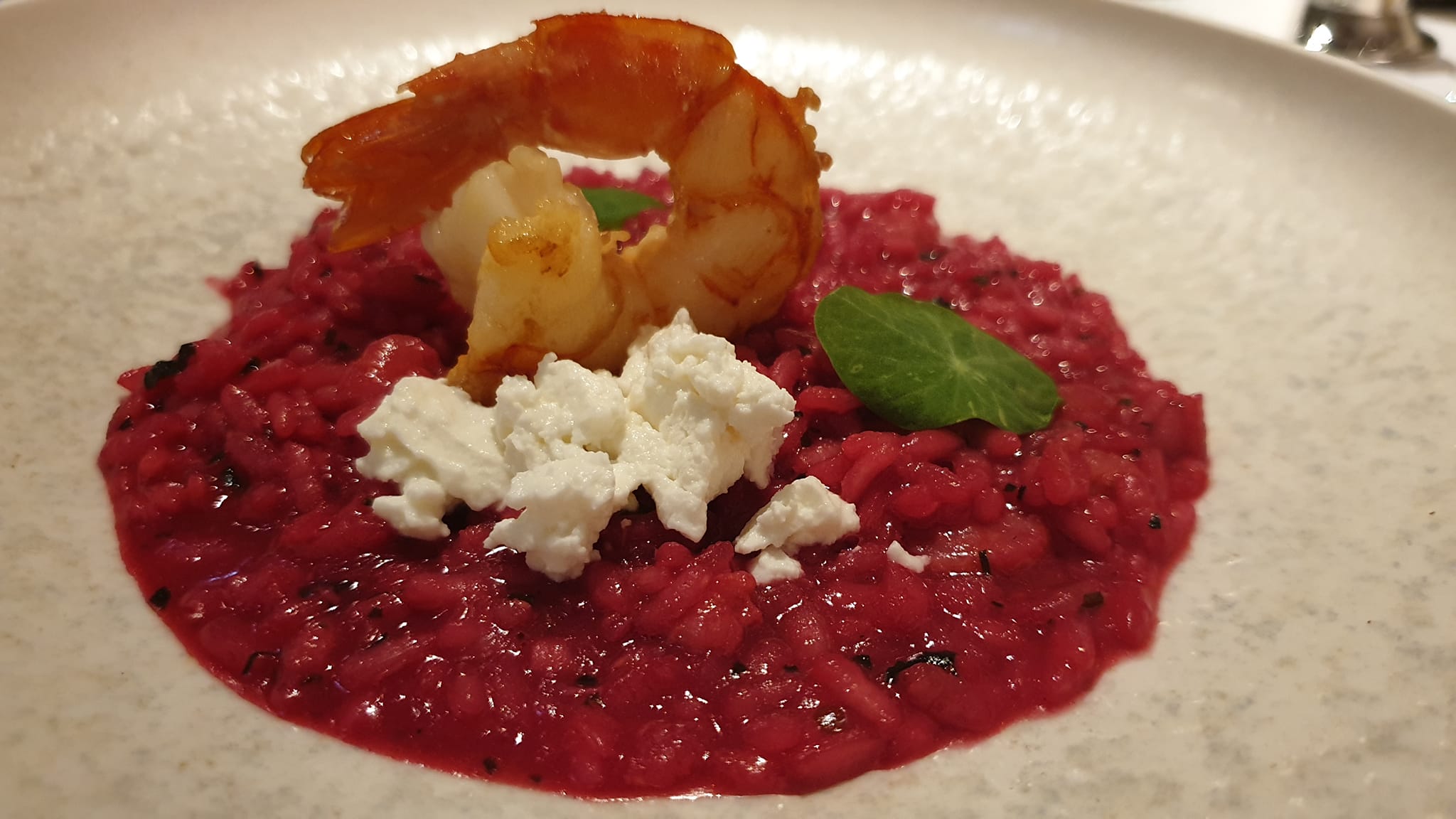
BEETROOT RISOTTO WITH GAMBERO ROSSO
-Gambero rosso prawn, Bisque, beetroot puree, goat cheese
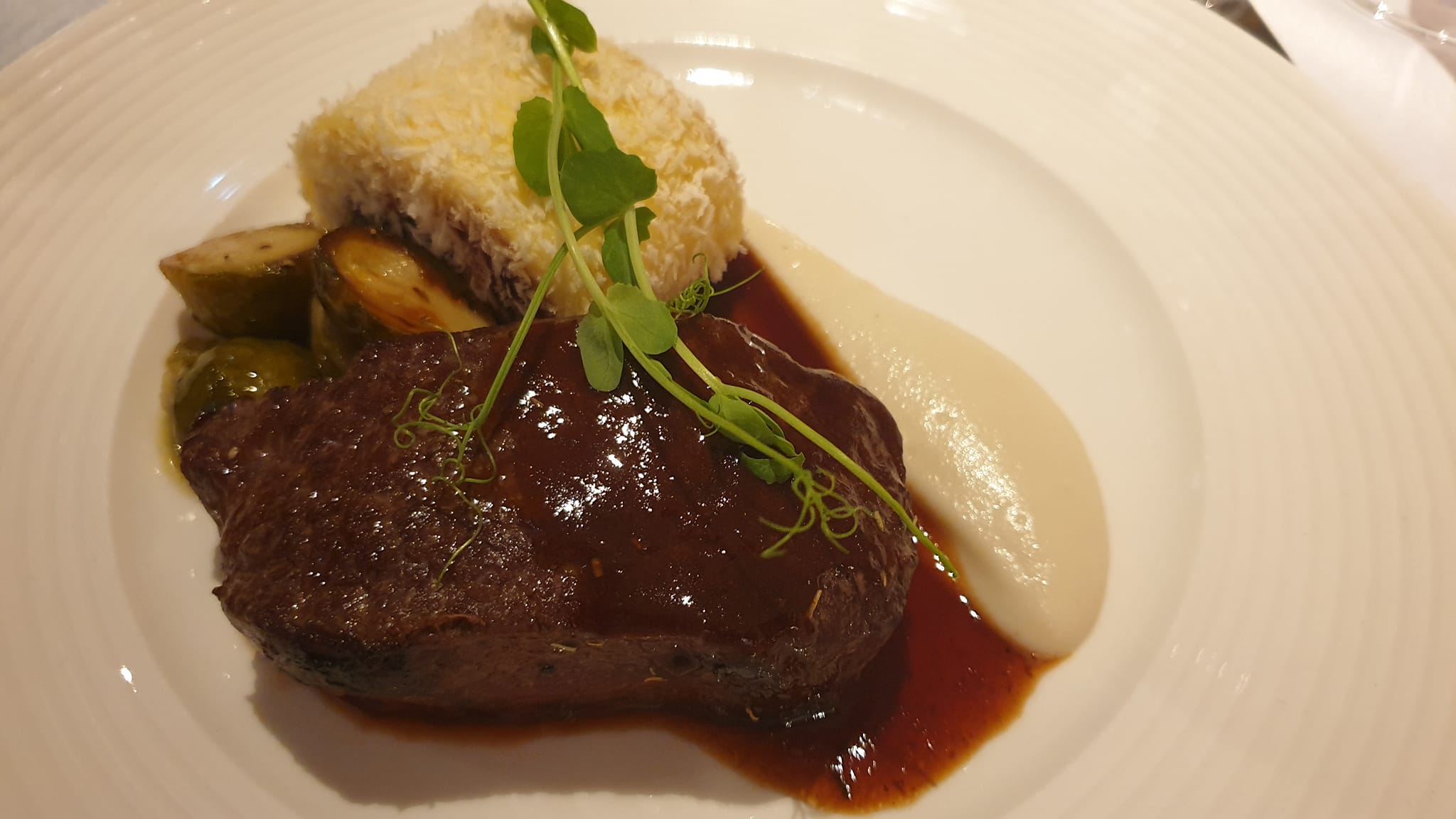
DEER
-Deer rumpsteak, Roman gnochhi roll with cranberry cooked in Port wine, Jerusalem artichoke cream,
butter glazed Brussel sprouts, demiglace
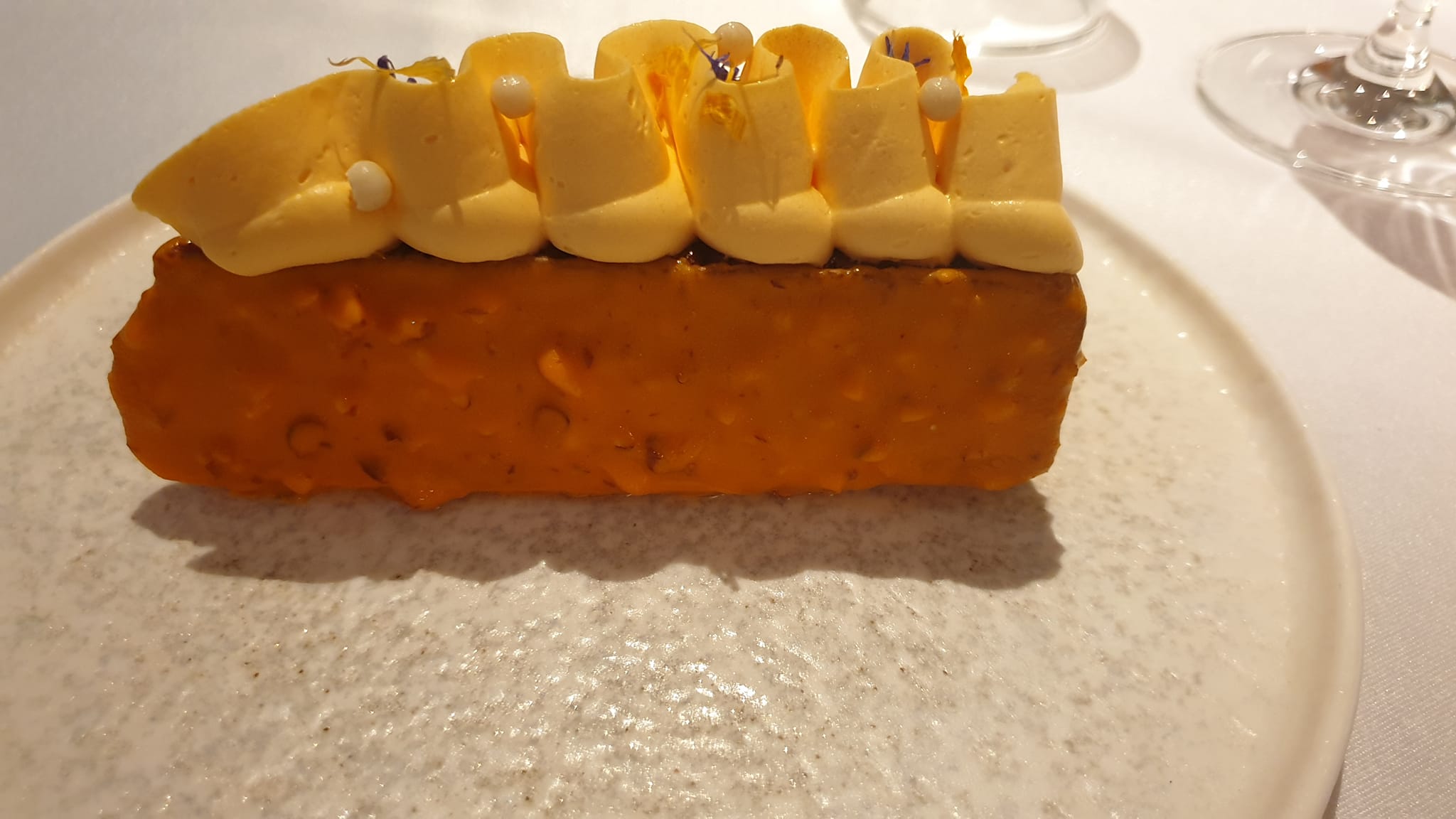
„VIŠKA TORTA“
Walnuts, orange chocolate, orange Chantilly
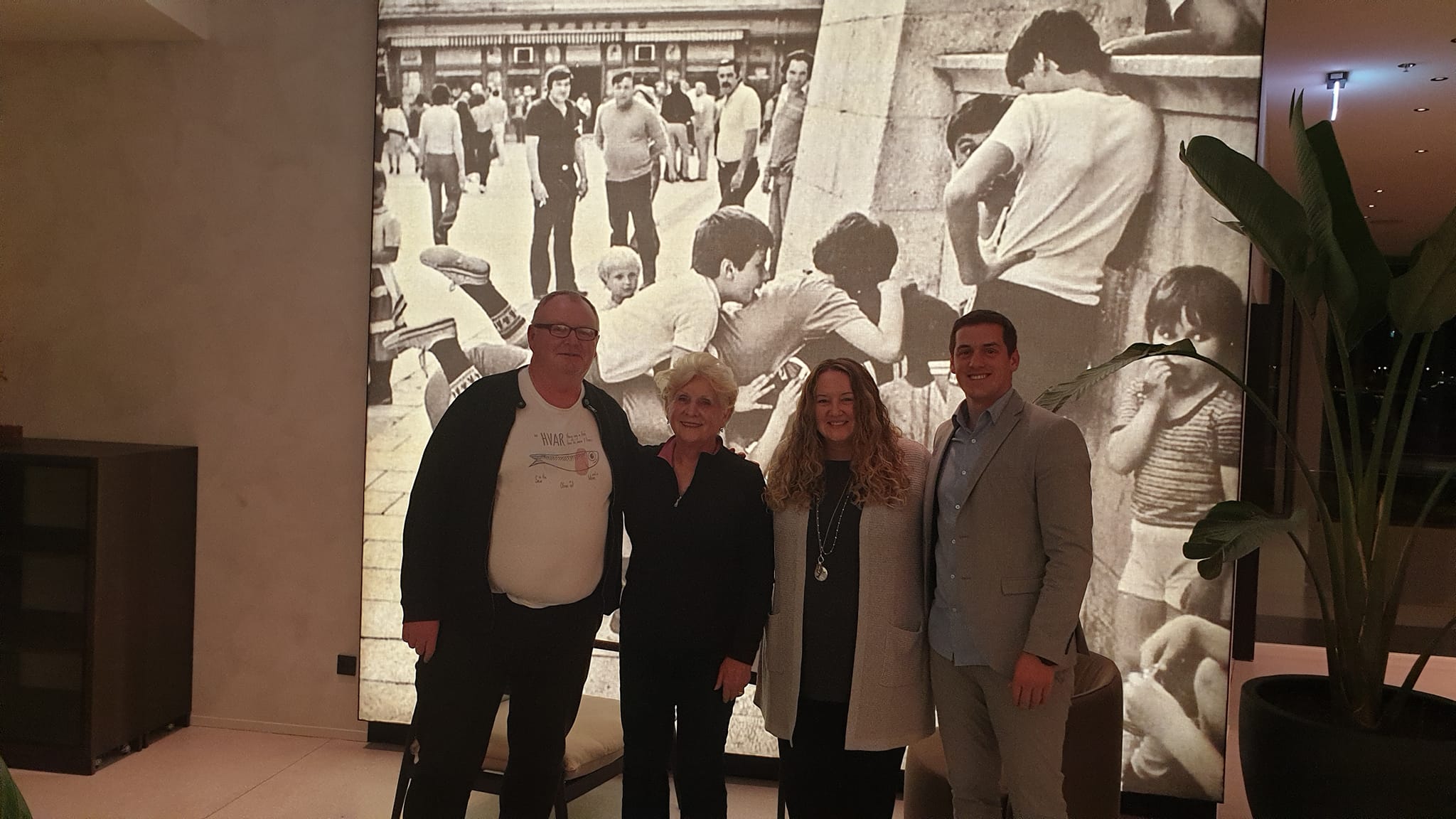
A wonderful evening of fine company, food and wine with Wanda and her colleague, Tia Lovisa Moreira, an evening made even better as charismatic Ambasador General Manager Stipe Medic joined us during the meal - Stipe is a great addition to the hotel, and his local knowledge and humour is just one more asset to this truly great addition to this new star of Split tourism.
Rovinj and Dubrovnik have long been the stars of luxury tourism in Croatia, and Split has always struggled to shine in this sector, at least in my opinion. The positive noises from Wanda and Tia echoed my own thoughts, as I retired to my room for one more night with the curtains open to enjoy THAT view. Rarely can a hotel have such a perfect view matched by an equally perfect location. Within walking distance of Diocletian's Palace and the Split marina, and yet far enough away from the crowds, Hotel Ambasador is the perfect entry point to enjoy the magic of the Dalmatian capital and its incredible history and heritage.
Learn more about Hotel Ambasador on the official website.
And if you want to know why Wanda Radetti and Tasteful Croatian Journeys are Conde Nast's preferred choice, check out their website.
Croatia and Japan to Meet in 2022 World Cup Round of 16
December 1, 2022 - Croatia and Japan will meet in the 2022 World Cup round of 16 on Monday, December 5.
With a 0:0 draw against Belgium in the 3rd round of Group F, Croatia secured a spot in the 2022 World Cup round of 16 on Thursday night.
Morocco topped Group F with seven points, Croatia finished in second with 5, and Belgium and Canada were knocked out of the tournament.
After Croatia and Belgium finished, the Group E matches were played. And what a crazy way we got to find out Croatia's next World Cup opponent.
Japan beat Spain 2-1 and topped Group E, meaning they play Croatia as the second-placed team min Group F. Spain thus finished second in Group E and will play Morocco, who finished first in Group F. Germany and Costa Rica have been knocked out of the tournament.
You can find all of the possible scenarios of how Croatia learned about its opponent below.
How Croatia's round of 16 match opponent was decided
Spain
If Spain beat Japan, they were guaranteed first place. A draw was enough for Spain to pass from first place. However, Spain could have dropped to second only if Costa Rica beat Germany. If Spain lost to Japan, they needed a draw between Costa Rica and Germany or for Germany to win to advance. In that case, goal difference is the deciding factor.
Japan
Japan could not lose if they wanted a spot in the round of 16. If Japan and Spain drew, Japan would go through if Germany and Costa Rica drew. A draw could also happen if Germany won, but then the total number of goals scored by those teams is considered. A Japan win secured their spot in the next round, almost certainly from first place.
Germany
Germany was in the most difficult situation in terms of points and only needed a win against Costa Rica. With a win, Germany would be in second place. However, they could only be first if Japan beat Spain - then the goal difference between Germany and Spain would be considered, and Spain has a big advantage there.
Costa Rica
Costa Rica would be eliminated if they lost. They could only move on with a point if Spain beat Japan. If Costa Rica won, they could have been first only if Spain and Japan played a draw.
Croatia and Japan thus play their round of 16 match on Monday, December 5, at 6 pm local time.
To follow the latest sports news in Croatia, follow TCN’s dedicated page.
Croatia Entering Schengen Area: No EU Member State has Objections
December 1, 2022 - The ambassadors of the EU member states discussed the expansion of the Schengen area and the proposal of Croatia entering Schengen. According to diplomatic sources, none objected to the proposal to admit Croatia to the zone without internal border controls.
As Index writes, the Committee of Permanent Representatives (Coreper), which consists of ambassadors of the member states, discussed the expansion of the Schengen area to Croatia, Bulgaria, and Romania as part of the preparations for the meeting of the Council for Justice and Internal Affairs next week.
No member state had objections to the proposal to admit Croatia to Schengen. According to their internal rules, some member statesmust obtain the approval of the competent committees in their national parliaments for their positions in the EU Council.
The governments of Sweden, Denmark, Slovenia, and the Netherlands have submitted proposals to their parliaments supporting Croatia's entry and are now waiting for their green light. All other EU and Schengen members have already confirmed their support for Croatia. Coreper will again have the expansion of the Schengen area on the agenda on December 7, a day before the meeting of interior ministers who should take the final decision.
Austria is allegedly against Bulgaria and Romania entering
According to diplomatic sources, the Dutch ambassador was against accepting Bulgaria, Germany supported all three countries, and Austria was against Bulgaria and Romania. Another diplomatic source told Hina that France is strongly committed to Romania.
The problem is that Bulgaria and Romania cannot be separated because the border between these countries was never even intended to be the external Schengen border. To separate the two countries, it would be necessary to prepare the protection of that border and organize the border crossings in accordance with the Schengen rules, and this would take several years.
According to this source, there may be pressure on those who oppose Bulgaria and Romania so that all three countries enter, but it is more likely that only Croatia will get the green light. On the agenda are proposals for two decisions, one for Croatia and one for Bulgaria and Romania. The decision requires the consent of all 22 member states in the Schengen area.
For more, make sure to check out our dedicated News section.
Croatia Advances to 2022 World Cup Round of 16!
December 1, 2022 - Croatia and Belgium finished 0-0 at Ahmad bin Ali Stadium on Thursday night, which was enough for Croatia to advance to the 2022 World Cup round of 16!
Croatia and Belgium met at Ahmad bin Ali Stadium on Thursday, December 1, for their final Group F match at the 2022 World Cup in Qatar.
The Croatia national team enters the last round with 4 points: 1 point for drawing against Morocco and 3 points after defeating Canada 4-1. Belgium, on the other hand, had only 3 points going into the final round. While they narrowly beat Canada, they suffered a shocking defeat to Morocco (0-2).
Belgium needed a win to advance to the round of 16, while Croatia would be safe with a draw. Croatia losing would seriously complicate their chances of moving forward and would depend on the result between Morocco and Canada in the other Group F match.
There has been a lot of talk about the crisis in the Belgium camp as one of the world's top national teams struggles to find its rhythm. Are they motivated enough by the noise to prove everyone wrong against Croatia?
Lineups
Croatia: Livaković; Juranović, Lovren, Gvardiol, Sosa; Brozović, Modrić, Kovačić; Kramarić, Perišić, Livaja
Belgium: Courtois, Alderweireld, Vertonghen, Meunier, Castagne, Witsel, Dendoncker, De Bruyne, Carrasco, Trossard, Mertens
Match report
Seconds after the whistle to start the match, Perisic hit a rocket at Belgium's goal, which went wide. Croatia was dangerous in the next few plays and got the ball into the penalty area.
Carrasco threatened in the 3rd minute, but Croatia's defense cleared any potential danger.
Croatia looked calm as they played one-twos up the midfield, working their way into Belgium's box.
Belgium picked up their game and looked for holes in the Croatia defense to play through to Carrasco. There was a close encounter in the 11th minute when he shot near post, but it was brilliantly kicked out by Livakovic for a Belgium corner.
A quick counter for Belgium in the 12th minute saw De Bruyne take the ball up into Croatia's half, finding Mertens alone on the left wing. Fortunately, Mertens shot high over the goal.
Modric took a free kick in the 14th minute. The ball made it into the penalty area and the play ultimately resulted in Kramaic falling to the ground. The ref immediately called for a penalty. After consulting VAR, the penalty was recalled due to offside.
Croatia looked better than Belgium in the first 20 minutes of the match. They quickly found their rhythm, was first to every ball and put pressure on the defense. They only had to watch out for quick Belgium counterattacks thus far.
Croatia was awarded a corner in the 26th minute, which was cleared by the Belgium defense.
Belgium spent a few minutes in Croatia's half, unable to produce anything dangerous enough for a goal. Croatia was composed with short passes up the pitch to regain possession.
Sosa worked his way up the left wing and found Brozovic alone at the top of the box, who took one touch too many before shooting. Livaja tried with his head but went over the goal.
Up until now, Belgium struggled to connect passes or crosses. However, Belgium regained possession in the last 5 minutes of the first half and began to control the game. Mertens had a chance in the 43rd minute, and De Bruyne tried crossing into the penalty area in the next play, which was saved by Livakovic.
Kramaric found Sosa in Croatia's next attack, which he shot over the goal.
Lukaku was warming up to go in for the second half. The referee announced four minutes of additional time. Juranovic closed out the half with a volley on goal.
The first half ended 0-0. The other Group F match between Canada - Morocco ended 1-2 at the half.
The first half ended with 46% possession for Croatia and 53% for Belgium. Both teams had 5 shots on goal, 0 on target, and 1 corner kick.
The second half started with no substitutions for Croatia. Lukaku replaced Martens for Belgium.
Belgium had a dangerous chance in the 48th minute, which Gvardiol cleared for a corner. The ball ultimately found Lukaku's head and ended in Livakovic's hands.
Croatia had an excellent chance in the 50th minute. Gvardiok received the ball at the top of the box, faked the defense, and found Kovacic, whose shot skimmed off Courtois' fingers for a corner.
Croatia had another great chance three minutes later. Brozovic picked up the pass on the edge of the penalty area and shot directly at Courtois. Modric did the same moments later.
Trossard came off for Thorgen Hazard in the 58th minute.
The most dangerous chance of the match came in the 60th minute. De Bruyne brilliantly played Carrasco. The Croatia defense tried clearing the play before the ball found Lukaku. His shot rocked the post.
Croatia made their first substitutions in the 64th minute - Petkovic came on for Livaja and Pasalic for Kramaric.
Croatia threatened again in the 67th minute. Modrić received a great cross from the penalty area. He shot sharply to the right side of the goal, but Courtois made a great save.
In the 72nd minute, Leander Dendoncker came off for Youri Tielemans and Yannick Carrasco for Jeremy Doku.
The match attendance was announced in the 76th minute - 43,984.
Ivan Perisic dribbled through Belgium's defense but failed to get a shot off in time. The ball was cleared by the Belgium defense and ended up in Croatia's box and ultimately out a Belgium corner. Croatia got lucky.
Croatia had a few chances in the next few minutes. Juranovic got the ball into the box, and Petkovic played Broz into the penalty area. Broz just missed the ball.
But another dangerous attempt from Belgium followed, with Lukaku just missing the goal.
Eden Hazard came on in the 87th minute and was given the captain band from De Bruyne.
A Belgium free kick in the 88th minute went into the hands of Livakovic. And another even more threatening play that Livakovic saved on the goal line.
The ref added 4 minutes of stoppage time to the end of the match.
Lovro Majer came on for Kovacic in the 90th miunte.
It was a very tense last few minutes with everyone on the edge of their seat. But the minimum result we needed, we got. Croatia and Belgium finished 0-0, which was enough for Croatia to advance to the last 16!
Luka Modric was awarded the man of the match.
Group F crosses over with Group E. The final group E matches are played later tonight, when Croatia will learn its opponent.
To follow the latest sports news in Croatia, follow TCN’s dedicated page.
Euro in Croatia: Upgrades on ATMs for an Easier Transition
December 1, 2022 - Tihomir Mavricek, executive director of the Cash Sector of the CNB, spoke about the introduction of the euro in Croatia for the N1 television. One month before the introduction of the euro as an official means of payment in the Republic of Croatia, citizens were able to purchase initial packages of euro coins.
Poslovni reports. "The initial package of euro coins contains 33 coins, three coins of 2 and 1 euro, 5 of 20, 50 and 10 cents, 3 of 5 cents, 4 of 2 cents, and 5 of 1 cent. The total value is 13.28 euros, and our citizens will be able to get it for exactly one hundred kunas in all branches of banks, post offices, and Fina", said Mavricek.
"They must not be used for payment until January 1, 2023," he emphasized for N1.
He also clarified why these euro coins are not allowed to be used by citizens and why they would not be valid in, for example, Slovenia. With the first of January, the euro becomes a means of payment.
"Until then, citizens could have problems if they pay with these coins, and they could also receive a fine because it is not a legal means of payment until then," said Mavricek.
He states that this is one of the last steps to prepare for introducing the euro in Croatia. He also referred to euro banknotes. "All the necessary quantities of euro banknotes are in our vaults; they are already being distributed to the banks."
He added that ATMs would be adjusted in December to dispense euros from January. "From January 15, the entire network of ATMs will dispense euros."
Mavricek mentioned another critical change that will facilitate the transition to the euro. "The CNB has agreed with the banks that from December 15, the fee for withdrawing banknotes from ATMs of other banks will be abolished, for kuna until the end of December, and for euros from January 1 to 15."
What will happen to kuna coins after the changeover to the euro?
"From the first of October, when we urged our citizens to deposit extra kuna in banks, coins started to arrive, and they will be taken care of safely. This means that in three years, they will be sold as secondary raw materials when they cease to be a means of payment. It is a huge logistical task, and it takes time," Mavricek said, adding that kuna coins can also be recycled into euros.
"We will process and cut the banknotes on the banknote processing systems, and then the rest will be taken care of," he concluded.
For more, make sure to check out our dedicated Lifestyle section.
Be Careful if You Like Feeding Birds, in Pula You Could get Fined
December 1, 2022 - Though they can be cheerful and cute, birds can create a mess in public areas. In Pula, they remind of measures to keep things under control - the prohibition on feeding birds.
As Poslovni / Glas Istre write, despite the engagement of falconers, the installation of loudspeakers with sounds of bird predators, and even colourful balloons - starlings and other birds still cannot be driven away from their favorite habitats in the city center.
One of those is the Giardini, or rather the crowns of centuries-old trees, from which flocks of birds decorate the heads of passers-by and numerous tourists and restaurant terraces in summer. And it is not that individuals do not contribute to birds moving in, as they like to feed pigeons and other bird species in this particular location. Many, however, do not know that this is prohibited by the city's Decision on communal order.
The Communal Palace specifies that according to the said decision, it is not allowed to leave any waste or "contaminate in any other way surfaces where it is forbidden to feed birds, dogs, cats, and other animals."
Violation of this provision is punishable for legal entities under Article 177 and for natural persons under Article 180 of the decision above. The prescribed amount of the fine is from HRK 5 to HRK 10,000 for legal entities, while for natural persons, the fine is HRK 300 to HRK 1,000," the Communal Palace states.
They add that the city police do not keep special records for acts that violate the ban on feeding birds.
The City specifies that it is forbidden to feed birds, dogs, cats,and other animals in public areas, because this pollutes public spaces and birds then gather at the feeding grounds.
"Given the aggressiveness of certain bird species, this is used to protect people from the danger of excessive growth of a certain bird population, but also the need to keep animals under the control and supervision of experts. In addition, such actions also affect citizens' quality of life in terms of day and night rest, hygiene, pollution of facades, as well as other consequences that arise from it", the City states.
For more, make sure to check out our dedicated Lifestyle section.


